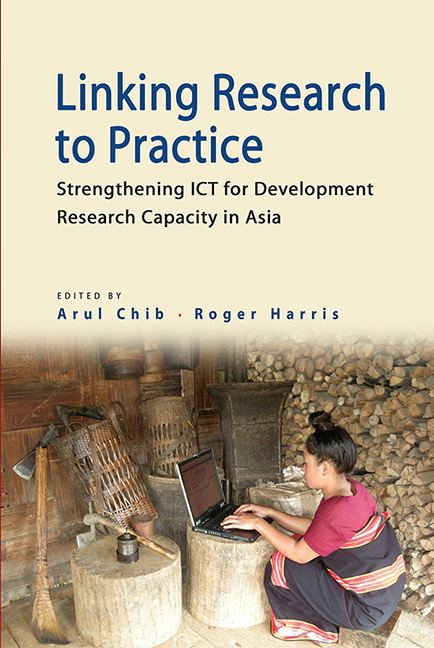Book contents
- Frontmatter
- Contents
- List of Tables
- List of Figures
- Foreword
- Preface
- Acknowledgement
- SECTION I MANAGEMENT PERSPECTIVES: INSIDERS' THOUGHTS ON THE PROGRAMME
- SECTION II RESEARCH PERSPECTIVES: THEORETICAL REFLECTIONS BY EXPERTS
- 5 ICTD Praxis: Bridging Theory and Practice
- 6 Messy Methods for ICT4D Research
- 7 Ethics and ICTD Research
- 8 ICTD Curriculum Development and Professional Training: Mainstreaming SIRCA Research Models
- 9 Multi-stakeholder Perspectives Influencing Policy-Research-Practice
- 10 From Production… To Dissemination… To Adoption
- SECTION III RESEARCH OUTPUTS
- SECTION IV SYNTHESIS AND CONCLUSION
- About the Contributors0
- Index
9 - Multi-stakeholder Perspectives Influencing Policy-Research-Practice
from SECTION II - RESEARCH PERSPECTIVES: THEORETICAL REFLECTIONS BY EXPERTS
Published online by Cambridge University Press: 21 October 2015
- Frontmatter
- Contents
- List of Tables
- List of Figures
- Foreword
- Preface
- Acknowledgement
- SECTION I MANAGEMENT PERSPECTIVES: INSIDERS' THOUGHTS ON THE PROGRAMME
- SECTION II RESEARCH PERSPECTIVES: THEORETICAL REFLECTIONS BY EXPERTS
- 5 ICTD Praxis: Bridging Theory and Practice
- 6 Messy Methods for ICT4D Research
- 7 Ethics and ICTD Research
- 8 ICTD Curriculum Development and Professional Training: Mainstreaming SIRCA Research Models
- 9 Multi-stakeholder Perspectives Influencing Policy-Research-Practice
- 10 From Production… To Dissemination… To Adoption
- SECTION III RESEARCH OUTPUTS
- SECTION IV SYNTHESIS AND CONCLUSION
- About the Contributors0
- Index
Summary
Development projects that focus on the use of information and communication technologies for development (ICTD) often involve multiple persons, organisations, methods, and locations that require multiple stakeholder partnerships to enable project success and sustainability. There is a need to develop practical yet theoretically-grounded studies that illuminate the realities of field-based ICTD projects that involve multiple stakeholders, who are inevitably involved in the process. Despite a growing body of literature particularly focused on an evaluation of impact on beneficiaries, there is a gap in research on stakeholder perspectives. We need to understand the complex interactions at the management, operations, and beneficiary levels that occur in the realms of practice, research, and policy. The objective of this study is to define and examine the perspectives of stakeholders in order to develop knowledge on the management of multi-stakeholder ICTD project partnerships. To do so, we develop and propose the Stakeholder Communication Model, which begins this process of understanding by focusing on communication patterns between and among various stakeholders in ICTD projects.
INTRODUCTION
The spotlight on ICTs for development emerged in the last decades of the 20th century when the Internet and the Millennium Development Goals (MDGs) were developed. The confluence of these two phenomena resulted in “a new tool in search of a purpose” (i.e. the Internet and ICTs), and the MDGs “were new targets in search of a delivery mechanism” (Heeks 2008, p. 27). A sudden bout of projects, programmes and publications, especially in less-developed countries, occurred, and new, larger stakeholders, such as non-governmental organisations (NGOs) and international development organisations, entered the fray of development work as these two arenas met.
Unfortunately, the newness of the field led to many problems. Early assessments of the field have criticised it as being Western-centric and economically exploitative of the Southern states (Ojo 2004).
- Type
- Chapter
- Information
- Linking Research to PracticeStrengthening ICT for Development Research Capacity in Asia, pp. 95 - 106Publisher: ISEAS–Yusof Ishak InstitutePrint publication year: 2012



